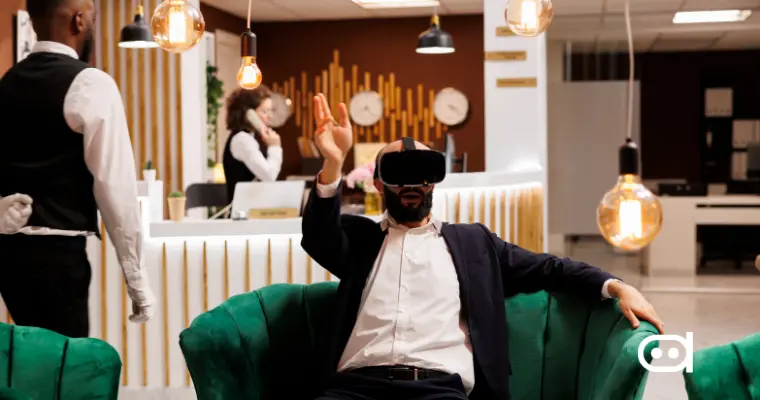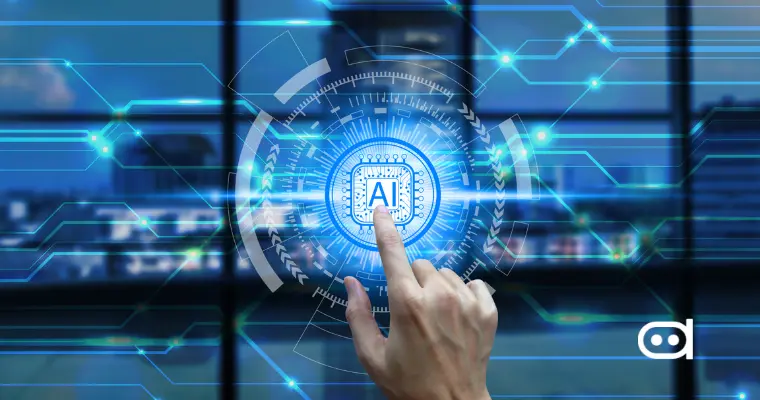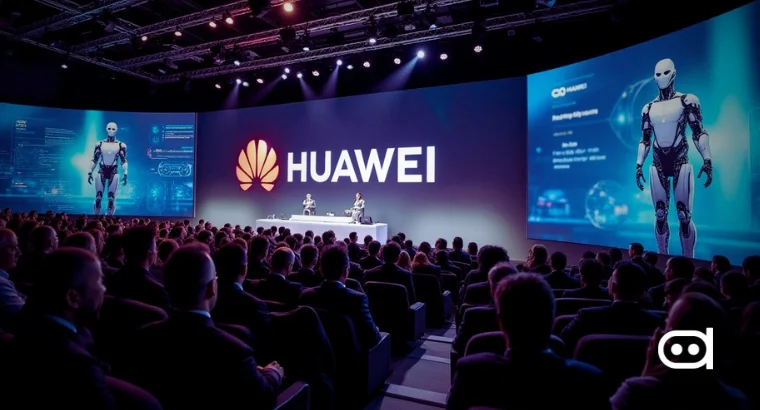
The hospitality industry is going through a severe technological revolution. AI-powered wearable devices are at the forefront of this transformation, opening pathways to customization, efficiency, and enhanced guest experiences like never before. Utilizing these smart devices allows hospitality businesses to gather crucial information while delivering guests the ultimate convenience and seamless services. Personalized room environments and streamlined check-ins are just some things AI wearables will bring to the future of hospitality. With thoughtful efforts in creating attractions, progressive hospitality brands will soon use AI wearables to keep up with the shifting demands of tech-savvy travelers.
What is Wearable AI?
Wearable AI implies any form of artificial intelligence technology in the restaurant industry used as body-worn gadgets. These advanced devices consist of sensors, connectivity equipment, and intelligent software to collect and analyze data about users and the user’s environment. Therefore, in the AI for hospitality context, wearables can include smartwatches, fitness trackers, smart wristbands, AR glasses, and special guests’ badges provided during their stay.
What separates AI wearables from plain and simple add-ons is that they learn from the data they acquire and adapt per that. These devices consistently capture information about the guests’ preferences, behavior, and interactions with the hotel facilities. The AI systems process this data and find patterns to make personalized recommendations or automate services. For instance, the wristwatch may observe the occupants’ preference for temperature and set that temperature when the occupants enter the room for a truly personalized hospitality experience.
How AI Wearables Enhance Customer Experience
AI wearables create a seamless and highly personalized guest experience throughout the customer journey.
Personalized Service
Based on analyzing guest data from wearables, hotels adjust room temperature, lighting, and entertainment systems to suit individual preferences. Environment settings could be adjusted automatically according to guests’ preferences as they walk into their room wearing a hotel smart device. This personalization goes further than the room alone, as AI systems gather information on dining preferences, activity interests, and service timing to create truly personalized experiences for the guests.
Contactless Access
Wearables serve as digital keys to the guest rooms, abandoning the need for plastic cards altogether and thus simplifying check-in processes. With smart wearables, guests can avoid the front desk and head straight to their rooms. This contactless option, especially after the pandemic, reduces the number of physical touchpoints while offering convenience and mobility for the guests around the property.
Enhanced Safety & Security
Intelligent wristbands are equipped with safety features like emergency alerts and location tracking. This proves useful for families with children and elderly guests in large resort complexes. The devices can also enable restriction monitoring, alerts to notify guests entering dangerous areas, and quick access to emergency services at the touch of a button while maintaining a privacy boundary.
Guest Feedback
Wearables now enable real-time data collection that would further facilitate service improvement. Rather than post-stay surveys, hotels can gather immediate feedback from the guests or patrons regarding their experiences with quick nudges on their wearables. This means that staff will have the opportunity to solve a problem early, more often than not turning negative experiences into positive ones and avoiding damage to overall satisfaction.
Language Translation
AI wearables are bridging the communication gap between nationalities in international hospitality. Such devices, especially those with translation functions, allow guests to converse comfortably with staff members even when they do not speak the same language.
Real-time Interaction
Guests can use their wearables to request services like room service, make dining reservations, or ask about points of interest straight from their wearables. Such requests are easier than using the in-room phone, the concierge desk, or an app on the phone. The immediacy of AI wearable technology means the guest can make requests while on the go, whether resting by the pool or exploring the grounds themselves.
Data-driven Insights
Data accumulated through wearables could be used to find trends in guest behaviors to optimize services and enhance the guest experience overall. In addition, examining aggregate data on facility use, service requests, and guest movements through the property will enable hospitality providers to arrange staffing, amenity placements, and service offerings based on informed decision-making for better operational efficiency and resource allocation.
Examples of AI Wearables Used in Hospitality
Some AI customer experience examples of wearables used in hospitality include:
Smartwatches
AI Smartwatches integrated with hotel services become an all-around service assistant for guests, including room keys, payment methods, and information access, all in one smart device. Staff-worn smartwatches facilitate an efficient service delivery mechanism as they can view guests’ real-time requests and important notifications without having to check a central computer system repeatedly.
Smart Wristbands
Lightweight and waterproof smart wristbands are the most easy-to-use gadgets in any resort for contactless payment and identification for guests, along with personalized notifications. Purpose-designed devices usually have a long battery life and a simplified interface for hotel-related purposes. Most resorts have programmed these wristbands into all-in-one devices that provide access to the rooms, make payments for various services, or participate in activities.
Smart Glasses
Staff-worn smart glasses can give employees real-time data about guests, direct them to the right paths, and provide customer service artificial intelligence histories to support interactions between successful patrons and staff members. Wearables like augmented reality devices can give patrons names, preferences, and special occasions when a team member approaches that patron.
Challenges & Limitations
AI wearables have tremendous benefits regarding expected operational functionality but are not free from certain hindrances.
Privacy Concerns
Privacy considerations must be taken care of concerning the collection of wearables data and the usage by guests, focusing on transparency and active consent from the users. It should inform the guests about the kind of data being collected, what will be done afterwards with the collected data, and offer the guests a chance to limit data-sharing options if they so wish. A proper security protocol for data should also be developed as wearables collect potentially sensitive information regarding a guest’s location, preferences, and activities during the stay.
Technology Adoption
Not all guests are as proficient in handling technology, and thus, wearable tech needs to be understood by users across various guest demographics. Hotels would have to create guest user manuals, design intuitive user interfaces, and prove the system works for tech-savvy millennials and older travelers who have difficulty using it.
Integration with Existing Systems
AI wearables integration into current hotel management systems is difficult as most of them use legacy systems that were not made to operate wearable technologies at all. The seamless connection between wearable data and existing customer relationship management, room control, and service delivery systems will be an expensive undertaking that requires investment in solutions and highly specialized technical competence.
The Impact of AI Wearables on Efficiency & Customer Satisfaction
Artificial intelligence wearables are measured on the improvements they have made in operational efficiencies and guest satisfaction metrics across hospitality properties. They also impact staff productivity because when routine tasks such as the check-in process and room access are automated, staff members can instead focus on high-value guest interactions that need a human touch.
Probably the most successful large-scale example of implementing wearable technology with AI in the hospitality industry is the Magic Band system of Disney. Waterproof wristbands double up to serve as room, park tickets, and payment methods along the Disney chain. Guest satisfaction scores have risen dramatically after the implementation of this system and Disney has especially been praised for shorter waiting times and personalized experiences enabled by the technology.
Future of AI Wearables in Hospitality
The future of AI and hospitality is bright. The pace of evolution of wearable AI in the hotel industry will receive an additional boost with advances in technology as next-generation wearables will come with advanced biometrics for mood detection, allowing hotels to match their services with the emotional states of guests. Integration will be seamless with voice assistants, enabling guests to command room functions and request services, through their AI wearable devices.
This would include connecting AI wearables to in-room devices, hotel robots, and systems for predictive analytics, creating an ecosystem that generates the highest possibility of anticipatory service in the hotel, wherein it can predict what guests need before they voice out their demands. AI in the hotel industry needs to develop flexible architectures that would allow deployment and integration with future-generation wearables.
In Summary
AI wearables have changed the face of hospitality and offer the opportunity to move toward another level of guest experience personalization, convenience, and efficiency. They integrate the physical and digital attributes of the guest journey, creating perfectly smooth interactions that would have seemed like science fiction only ten years ago.
As with any technology, the balance between innovation and human-centered service principles is key to successful implementation. The best application of AI wearables does not replace human interaction; it enhances it by eliminating friction points and providing employees with the necessary information to deliver truly memorable experiences. In an industry built around personal connection, AI for the hospitality industry has become an extremely powerful tool in creating truly exceptional guest experiences.








